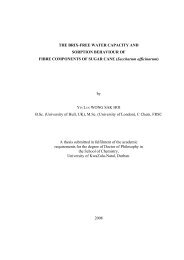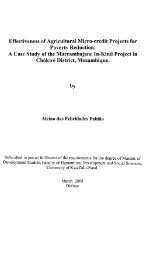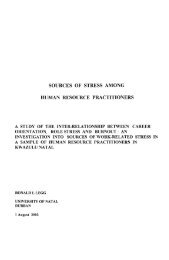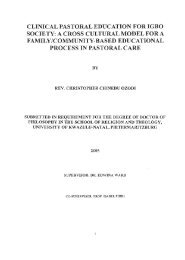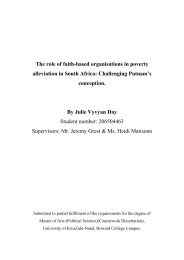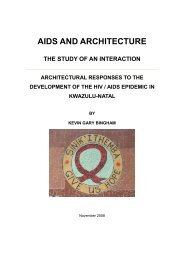View/Open - ResearchSpace - University of KwaZulu-Natal
View/Open - ResearchSpace - University of KwaZulu-Natal
View/Open - ResearchSpace - University of KwaZulu-Natal
Create successful ePaper yourself
Turn your PDF publications into a flip-book with our unique Google optimized e-Paper software.
edridden patient, how to maintain a clean environment for clients and how to dispose <strong>of</strong> the<br />
used gloves and other waste properly. They also learnt how to improvise when they did not<br />
have materials:<br />
“Infection control practices are the ways in which we protect ourselves from diseases when<br />
we are doing our work on our patients. So you see! We have gained quite a lot <strong>of</strong> skills.<br />
Honestly, we didn’t know anything when we came here. Now we know that you don’t<br />
necessarily have to pick up a sick person who does not walk to the bathroom, but you can<br />
bed-bath them and change their diaper, linen and clothes without using too much effort <strong>of</strong><br />
lifting them. We now have a lot we have learnt on how to comfort the patient, giving them<br />
hope not discriminate them, teaching family members how to do the work, love and care for<br />
their patient. With sexually transmitted diseases, we now have knowledge about them the<br />
types, signs and everything, and about T.B we are able to use masks and gloves to protect<br />
ourselves and also to explain to people how they must protect themselves from STDs or T.B.<br />
(Focus group 1, organisation A)<br />
“Home based care training has really helped us because we did not know a lot <strong>of</strong> things. We<br />
now even know how to take care <strong>of</strong> ourselves from infections and how to take care <strong>of</strong> our<br />
families. And for the patients, we know how to care for them. We now have the knowledge <strong>of</strong><br />
what to do in certain situations when a patient has a certain condition or even when you<br />
don’t have material you can use what is there like plastic for bread if you don’t have gloves<br />
and salt to clean the wounds”. (Focus group 7, organisation G)<br />
4.4.2 Materials for infection control practices<br />
Materials are important for effective infection control practices by volunteer caregivers.<br />
Findings revealed that most participants from all organisations received home based care kits<br />
which they called “green bags” that contained various materials for medication and infection<br />
control supplied by the Department <strong>of</strong> Health (DoH). During focus group discussions,<br />
participants were asked to discuss and list the materials that were supplied in the HBC kits in<br />
order <strong>of</strong> their importance. Across all organisations, findings reviewed that, in terms <strong>of</strong><br />
infection control practices, protective clothing were the most important. Materials that were<br />
used for practicing hygiene and for waste disposal were seen to be important compared to<br />
medication materials. Table 4.3 below shows the materials contained in the kits in order <strong>of</strong><br />
importance as mentioned by caregivers.<br />
45




